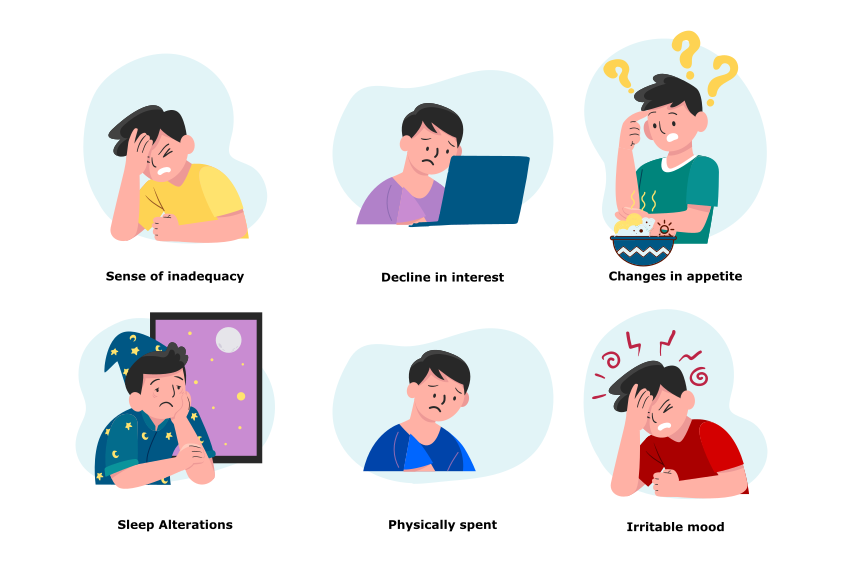Depression vector created by pch.vector - www.freepik.com and Inkscape.org
indicators of depression
Do you suspect that you may be depressed? Here are some warning signs of depression to watch out for, along with advice on seeking the support you require.
What exactly is depression?
It's normal to feel low occasionally, but when feelings like hopelessness and despair become pervasive and challenging to control, you may be suffering from depression. Depression alters your thoughts, feelings, and ability to carry out daily tasks. It is more than just melancholy brought on by difficulties and failures in life. It may make it difficult for you to work, study, eat, sleep, or simply enjoy life. It might be stressful just to get through the day.
While others feel dead, empty, and indifferent, other persons with depression describe it as "dwelling in a black hole" or having a sensation of impending doom. Particularly men may experience anger and restlessness. Regardless of how you feel about the issue, if it is not resolved it could lead to major health issues. It's crucial to keep in mind that helplessness and hopelessness are symptoms of depression rather than an accurate reflection of your circumstances.
Regardless of how dismal you may feel, things can improve. You can start feeling better and resolving the issue by being aware of the causes of depression as well as its many symptoms and forms.
Symptoms and signs
Although the signs and symptoms of depression differ from person to person, there are some universal ones. It's crucial to keep in mind that these symptoms can be a part of the typical low points in life. But the likelihood that you are experiencing depression increases with the number, intensity, and duration of your symptoms.
Ten typical signs of depression
A sense of inadequacy and misery. The situation will never get better, and there is nothing you can do to change it.
A decline in interest in routine activity Your previous interests, pastimes, social activities, or sex is no longer important to you. Your capacity for joy and pleasure has been lost.
Changes in weight or appetite. A change of more than 5% of body weight in a month indicates significant weight loss or increase.
Sleep Alterations. Oversleeping or insomnia, particularly waking up early in the morning.
Angry or irritable mood. being restless, anxious, or even violent. You have a low tolerance threshold, a quick temper, and are easily irritated by anything or anyone.
A feeling physically spent, exhausted, and worn out. Your entire body could feel cramped, and even seemingly simple activities may take longer or be more difficult to do.
Your entire body could feel heavy, and even seemingly simple chores may take longer or be more demanding to do.
Self-loathing. Strong sentiments of remorse or worthlessness You are extremely critical of yourself for perceived flaws and errors.
reckless actions. You indulge in risky activities like substance misuse, obsessive gambling, driving carelessly, or dangerous sports as a kind of escape.Difficulty with focus. difficulty concentrating, deciding, or remembering.
Aches and pains without cause. an increase in bodily aches and pains such as headaches, backaches, muscle fatigue, and stomachaches.
Depression Vs Bipolar
Manic depression, (another name for bipolar disease), is characterized by significant fluctuations in mood, energy, thought, and behavior. It is frequently disregarded and incorrectly diagnosed because, while in the low phase, it resembles depression so closely. Since using antidepressants for bipolar disorder can actually make the condition worse, this could be a severe issue.
Consider getting tested for bipolar disorder if you've ever gone through phases where you had overwhelming emotions of exhilaration, a reduced need for sleep, racing thoughts, and impulsive behavior.
Relating Depression and Suicide
A significant risk factor for suicide is depression. Suicide may seem to be the sole means of escaping misery in situations of extreme despondency and hopelessness. Take any suicidal words or behavior seriously if you have a loved one who suffers from depression, and keep an eye out for these red flags:
Discussing one's own suicide or self-harm.
Expressing extreme helplessness or a sense of being trapped.
A strange obsession with dying or death.
Acting carelessly, like they want to die (e.g. speeding through red lights).
Contacting or visiting folks to bid them farewell.
Putting everything in its proper place (giving away prized possessions, tying up loose ends).
Making statements like "I want to go" or "Everyone will be better without me."
Quick transformation from a depressed state to the exact opposite.
In conclusion
There are signs and symptoms of depression that we can detect in ourselves as well as in others and we need to be mindful of them.
Early detection and prompt action could save a life.
If you notice any of these signs you should contact your primary health care physician or a psychiatrist.
Thank you for reading!!
References
- https://www.marystrueberlcpc.com/symptoms-depression
- https://feastonyourfeelings.com/what-are-signs-of-someone-struggling-with-depression
- https://www.bbrfoundation.org/research/depression
- https://www.helpguide.org/articles/depression/depression-symptoms-and-warning-signs.htm
- Anxiety vector created by pikisuperstar - www.freepik.com
- Low energy vector created by syarifahbrit - www.freepik.com
- Food background vector created by freepik - www.freepik.com

